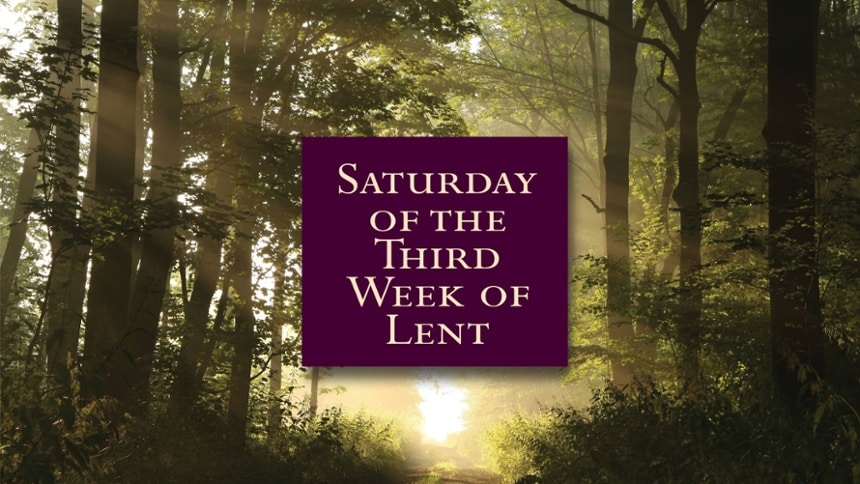Saturday of the Third Week of Lent | Readings: Hosea 6:1-6; Luke 18:9-14
REFLECTION
Jesus himself quotes twice from this passage from Hosea in Matthew’s Gospel, both times to defend himself from the “holier than thou” types: “What God wants is merciful people, not heroic sacrifices, God wants you to know how love intimately works, and then you can skip your gestures of self-sacrifice” (my paraphrase based on Hosea’s own descriptions in 2:21ff and 8:11ff ).
Jesus popularizes this somewhat neglected phrase in Hosea to defend himself from people who criticize him for consorting with sinners (Matthew 9:13), and again to defend his disciples and himself who are being criticized for not observing the Sabbath and feeding themselves (Matthew 12:7).
Both times he precedes it with a strong imperative or plea: “Go, learn the meaning of these words,” or “If you only understood the meaning of these words.” Well, it is still important that we learn the meaning of these words because much of religion has not. If we can get this, the Gospel of the publican and the Pharisee will quickly explain itself, and you will see that Jesus was an astute teacher, centuries ahead of modern psychology.
The Pharisee is the common heroic “sacrificer.” People do not realize that this gesture largely feeds the ego and one’s sense of self much more than anything else. God does not need it. You need it. Sacrifice is unconsciously an attempt to control God, who does much better without our control. “I fast twice a week, I pay tithes on all I possess…. I am not like the rest of men,” he says. It looks like you are giving to God, country, church, the sports team, so all will undoubtedly admire you for it.
The social payoffs are so ego-inflating, there is no likelihood that “for God and country” thinking will diminish anytime soon. Sacrifice is often good and needed in life to help other people, but too often it is an attempt to build a more positive self-image by distinguishing oneself from others. Note his words, “I give you thanks, God, that I am not like the rest of men, grasping, crooked, and adulterous.” Could the message be much clearer?
Our tax collector friend has apparently “gone and learned the meaning of the words” because from a distance with bowed head “All he did was beat his breast and say, ‘God, be merciful to me, a sinner.’” And then Jesus delivers his stunning conclusion, still stunning today: “Believe me, this man went home from the temple justified before God, but the other did not.” I hope you have observed that Jesus is never upset at sinners! He is only upset with people who do not think they are sinners. The Pharisee is a public holy man who is not holy at all. The tax collector in Israel is a public sinner, with no credits to his name whatsoever, who ends up being the saint.
TODAY’S READINGS
“Go, learn the meaning of the words, what I want is mercy, not sacrifice, knowledge of God, not burnt offerings in the temple.” —Hosea 6:6
“Jesus spoke this parable addressed to those who believed in their own moral superiority and who held everyone else in contempt. Two men went up to the temple to pray, one a Pharisee and the other a tax collector.” —Luke 18:9–10
STARTER PRAYER
“Merciful God, all I can give you, and all you ever want, is who I really am. This little woman or little man that I am now gives you back my only and true self.”
¡Haga clic aquí para ver la traducción en español!



2 thoughts on “Lent with Richard Rohr: The Illusion of ‘Sacrifice’”
Now in the second day of Passover 2024, I was thinking about the requirements of blood sacrifice and realizing that I walked away from that type of “god” when Ram Dass introduced me to a G-d of compassion in 1972 on pages 106-107 of his “Be Here Now”. Almost immediately I was introduced to Richard, Thomas Keating and others who continued to remind me that I was/am always in the presence of a loving G-d.
If my parents weren’t “chosen” people when I was born in 1947…as the first born of 7, I wouldn’t be here now penning these comments. The same applies to my brother-in-law Steve and my Jewish nephew Mike.
As the folk singers lament, “When will we ever learn that too many people have died…in the name of “god”…
Amen! Felt early on in my walk that if I could never “condemn” someone to eternal agony in hell, than how could a loving God?